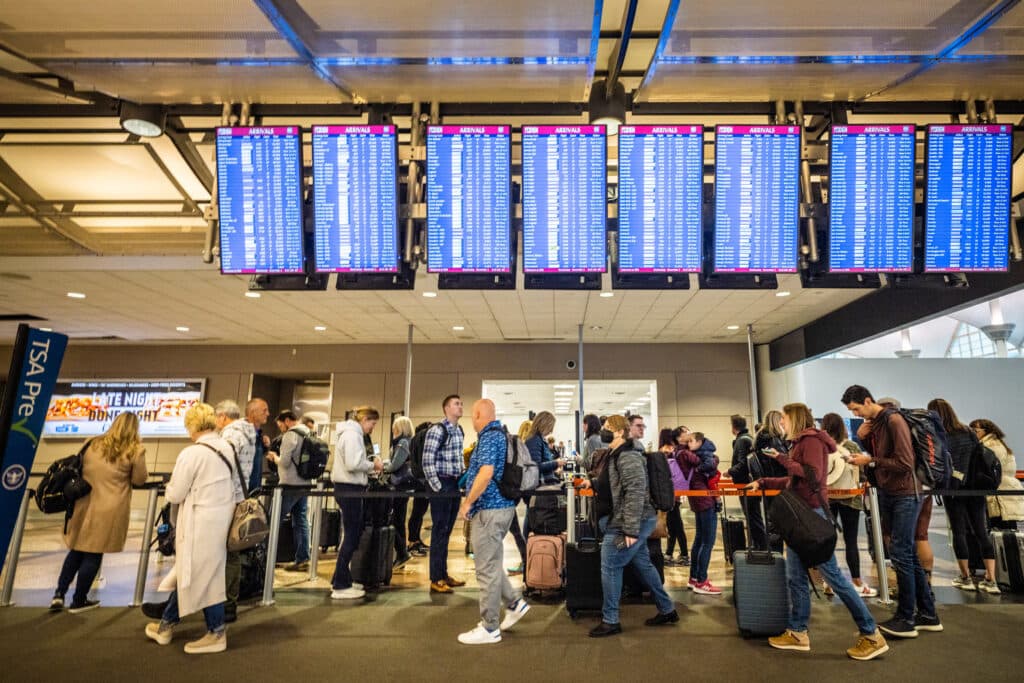
Friday marks the first missed paycheck for civilian employees of federal agencies — a turning point when the Washington stalemate has the potential to become a real economic shock for many Colorado families and communities.
Paul Teske, a Distinguished Professor at the University of Colorado Denver’s School of Public Affairs, told CPR News that the loss of income for tens of thousands of federal workers could quickly ripple through the state’s economy.
Colorado is impacted more than many states, he said, because it serves as a home base for major federal laboratories, environmental agencies and about 50,000 federal civilian employees working for departments like Agriculture, Interior and Veterans Affairs.
“In my mind, federal employees who are unsure about when they're gonna be paid will cut back on big ticket items they’ve been thinking about, like a new refrigerator or new car, first,” Teske said, “But they're also probably gonna cut down on things that are not necessities, so restaurant meals and things of that nature.”
These cutbacks, estimated to be by a few percentage points, will soon begin showing up in the bottom lines of local businesses, particularly restaurants, retail and service sectors, near major federal facilities in cities like Denver, Lakewood, Boulder and Colorado Springs.
Teske notes an economic slowdown of this kind typically becomes noticeable within a week or two of reduced cash flow. This time, that falls less than a month from Black Friday, one of the nation’s biggest holiday shopping days.
What help is available for federal workers?
Several Colorado credit unions, including Westerra in Denver, are already issuing Government Relief Loans to help workers make ends meet. VP of marketing Nicole Andrushko told CPR News that as of Thursday afternoon, they’d approved 19 members who are federal employees impacted by the shutdown for financial support totaling over $100,000. These short-term loans charge no interest as long as they’re paid off within six months.
“This is what credit unions are built for,” Andrushko said. “These loans cover all the day-to-day expenses they have in their life to fill the gap of what they're experiencing today.”
One Westerra member who works for The U.S. Department of Agriculture shared in an interview with the credit union that the loan meant they were able to put food on the table and that — more broadly — the government shutdown is forcing their family to have more holistic conversations about money.
“We've had conversations with our kids that we're not purchasing things that are ‘wants’ right now. We're focused primarily on purchasing things that are necessary. So really this government shutdown has given us the opportunity to evaluate our budget,” they said. The employee asked that their name not be made public.
In addition to loans, many federal employees are now eligible to apply for unemployment benefits, ushering in a new strain on Colorado’s unemployment insurance system.
Two town halls held by Colorado’s Department of Labor and Employment saw 700 attendees, all of whom are being impacted by the shutdown.
“Unemployment insurance provides for up to 55 percent wage replacement,” said deputy executive director Cher Haavind. “So it's not dollar for dollar. They are in a situation where these wages become critical to help them pay their mortgage or pay their rent or put food on their tables.”
Already, the state says around 1,500 furloughed federal employees have applied for UI benefits since the shutdown began. But it can take four to six weeks for claims to process, and that’s for people in normal circumstances.
“What makes the federal workers and the shutdown unique is the complexity of the claims,” Haavind said. “Number one, we don't have immediate access to their wages, whereas we would with a traditional employer in the state. So that does complicate matters when we need to do wage verification to determine their benefit eligibility.” Federal employees also have to pay back any benefits they receive once the government reopens and their back pay comes through.
Haavind said the state has updated its system in recent weeks to accommodate the anticipated influx of claims to ensure a smoother experience for those filing.
Nov. 1 marks a milestone across federal services
It’s not just federal workers and the businesses they frequent who are feeling the pinch. This week’s missed paychecks will begin the shift from the shutdown as a short-term inconvenience to a systemic stress on the social safety net, especially as federal workers are going unpaid at the same time that benefits dry up for SNAP recipients. Colorado’s food pantries are likely to see both groups seeking their help to keep food on the table.
Should the shutdown continue past Nov. 1, several Colorado early childhood Head Start programs for low-income families will also be at risk due to the timing of federal grants.
Impacted programs are spread out across several counties, including Larimer, Weld, Boulder, Denver and Adams, encompassing roughly 1,300 students.
Facilities may have to reduce services or temporarily close if they are unable to secure emergency funding, which could make things difficult for working parents without alternative childcare options.
The start of November is also when open enrollment begins for health exchanges under the Affordable Care Act, meaning millions of Americans will start shopping for their 2026 health coverage plans. If the subsidies are not extended, many could experience sticker shock.
Teske said typically, Democrats in Washington don't want a shutdown because they feel it'll disproportionately hurt their constituents, and the majority party, the Republicans, don't want to be held responsible for the shutdown either, due to public perception that they’re in control.
“This time feels a little different because I think they [the Republicans] see an advantage of possibly advancing their agenda of reducing spending and laying off employees. So, this one feels like it could last longer,” he said.
Because of this, Friday’s missed paycheck might not spur the quick reconciliation seen in past shutdowns. Instead, it could just be another grim milestone in a longer, more politically entrenched standoff.
If the shutdown lasts until Nov. 5, it will break the record for the federal government's longest shutdown, set during the first Trump administration.
At the airports, strain grows on unpaid essential workers
Congress will likely face increased pressure to reopen the government ahead of the Thanksgiving week travel spike. Like other government workers deemed essential, more than 300 air traffic controllers and an estimated 1,000 Transportation Security Administration officers are still on the job across Colorado airports. In past shutdowns, absences have risen the longer those employees are required to work without pay.
“Some of them got half a paycheck last payroll, and now they’re not going to get anything this Friday. Some of them might have a monthly withdrawal that automatically comes out that they don't remember — and it's gonna bounce,” said Angela Grana, Colorado regional vice president for the TSA local 1127 union.

Grana has been through two previous shutdowns in 2014 and 2018, and she echoed the sentiment that this time feels different.
“This is totally crazy. It’s like we're all blindfolded and we don't know what's gonna happen. We don’t know who to trust,” Grana said.
The average TSA screener makes $49,000 per year, according to the Bureau of Labor Statistics. “They are living paycheck to paycheck,” Grana said.
At Colorado's smaller airports, like La Plata in Durango, many TSA workers travel large distances to get to work. “Some of them come from Farmington or Cortez. They have a long haul. How they're affording the fuel to fill up their gas tanks is a big question,” Grana said.
In past shutdowns, absenteeism among TSA workers increased after they missed a full paycheck, as many were forced to find temporary work.
Grana said some TSA agents are working side gigs, like driving for Uber and Amazon, but she worries about the toll of those extra hours, especially on those working early shifts at the airport.
She also pointed out many TSA employees are younger, and experiencing their first shutdown. “I worry about them. The job alone is stressful. Passengers get nervous, passengers get upset with you. Then they’re stressed out and they have to focus constantly on making sure they get it right. They can't get it wrong ever. It just takes the bad guys one time to get it right. TSA can't miss that one time.”
Grana said workers are doing their best to support one another.
“We try to help each other the best we can, but we only have so many resources. It doesn't pay their bills to give them a box of Kleenex,” she said. “We want a paycheck, not a rain check. I mean, how would you feel?”
Grana said TSA absences are already starting to exceed the level to keep security lines at Denver International Airport moving at their usual rate, potentially leading to longer wait times.
Her advice to people traveling as the shutdown continues? “Pack your patience. Know that we're doing the best we can. We'll get you through this. We're gonna be short staffed, but we will get you there safely. One passenger, one bag at a time.”
Air traffic controllers earn higher wages, with the average annual salary estimated at $137,000, but the industry is already short staffed, which could mean any workers calling out sick in that field will have a faster impact on airport operations at major travel hubs like DIA.
Teske warns Coloradans should expect growing operational strain and potential safety slowdowns at local airports as morale and staffing continue to drop.

State dollars keep visitor centers open at RMNP
Meanwhile, the state announced Thursday that it’s providing funds to operate two visitor centers at Rocky Mountain National Park for the time being.
The funding agreement splits the $3,200 per day cost between the Department of Natural Resources and the Colorado Tourism Office starting Oct. 24, and continuing for a week.
“The tourism industry contributes $28.5 billion to Colorado’s economy and supports over 188,000 jobs across the state. Keeping Rocky Mountain National Park and these visitor centers open promotes a positive visitor experience, helps protect our state’s incredible public lands and supports a critical sector of our economy. We are proud to partner with the Governor and the DNR to make this possible,” said Colorado Office of Economic Development and International Trade executive director, Eve Lieberman in a press release.
At this time, all national parks in Colorado remain open but some with reportedly limited or unavailable services. In the past, shutdowns have impacted both the cleanliness and safety of national parks due to reduced staffing. As a result, businesses that rely on that tourism, like those in Estes Park, are also impacted.
Editor's Note: This story has been updated to remove some details of TSA working conditions.








